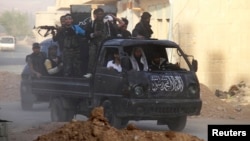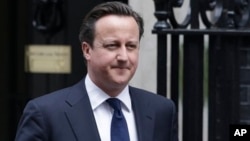TRIPOLI, LIBYA —
Britain is pressing its European partners to loosen the arms embargo that prevents Britain and France from sending weapons to Syrian opposition forces trying to oust President Bashar al-Assad.
The British move comes as the United States and Russia step up diplomatic efforts to bring the Syrian government and rebels to the negotiating table.
Both Britain and France have been lobbying behind-the-scenes for months for revisions of a European Union weapons embargo due to expire at the end of May. Britain’s proposal is for a continuation of the arms blockade on the Syrian government, but allowing weapons supplies to rebels affiliated with the opposition National Coalition.
Several EU countries, led by Germany and with the support of the EU’s own diplomatic corps, have resisted the lobbying from London and Paris. Their concern is that jihadist rebels, some a part of the al-Qaida-affiliate Jabhat al-Nusra, will be able to secure some of the arms.
European foreign ministers will meet in Brussels on May 27 to discuss renewing the blanket arms embargo.
Ahead of the meeting, British officials have circulated to their European counterparts a confidential working paper outlining two separate proposals.
“The situation in Syria is deteriorating sharply. With the likely use of chemical weapons and the growth of extremism, the conflict has entered an even more dangerous phase,” the working paper said. “We must consider all the options, [including] the ability to give further assistance to the moderate Syrian opposition.”
Exempt National Coalition
The first preferred option proposed by the British government would be to “exempt the National Coalition from the arms embargo” on the grounds that the embargo was “created in order to prevent the Assad regime from brutalizing its own people.”
The second proposal would allow supplying the opposition with so-called lethal equipment “intended for the protection of civilians.”
And in order to placate other European governments fearful of leakage of weapons from moderate rebel brigades to jihadists, the British officials say there must be safeguards and that National Coalition leaders must maintain control of any EU-delivered military supplies.
“If the EU were to amend the arms embargo, we would need to rigorously assess, monitor and review how any equipment was used in consultation with the National Coalition," the working paper said.
How that would be accomplished isn’t outlined in the proposal.
British Prime Minister David Cameron is scheduled to meet President Barack Obama at the White House on Monday to discuss Syria as well as other foreign policy issues, say British officials.
Cameron to seek Obama’s help
“He will likely try to enlist the president’s help to convince Germany and other EU countries that the time has come to rethink the arms ban,” said a British official who spoke on the condition of anonymity.
German officials argue that arming the rebels now will detract from attempts to get the Assad government and the rebels to negotiate an end to a two-year-long civil war that has left an estimated 80,000 dead and two million displaced internally, according to the United Nations. More than 1.5 million Syrians are now refugees in neighboring countries.
The British believe revising the EU arms embargo will put pressure on the Assad government to negotiate, and officials tell VOA they see no contradiction in wanting to arm the rebels while at the same time pressing for peace talks and a negotiated end to the war.
On Tuesday, U.S. Secretary of State John Kerry and Russian Foreign Minister Sergei Lavrov said they intend to convene an international conference to launch peace talks between Syria's government and rebels fighting to end Assad's rule.
The announcement came after Kerry held more than three hours of talks with Russian President Vladimir Putin.
Syrian opposition leaders say any political solution would have to include Assad relinquishing power.
The joint British-French lobbying effort comes as U.S. officials are considering expanding non-lethal aid to Syrian rebels.
Russia’s anti-aircraft missiles
It also coincides with U.S. concerns that Russia, despite agreeing to try to get peace talks underway, may be weighing supplying the Assad government with S-300 air-defense missile batteries. That would be a major updating of the systems Syria already possess, according to U.S. officials who spoke to the Wall Street Journal.
While Syria is said to have extensive air defense capabilities, Israeli warplanes carried out three airstrikes on Syria recently to stop what Israel said were missile transfers from the Assad government to the Lebanon’s Hezbollah militants. S-300 missile batteries would pose a greater threat to Israeli jets.
The Russian missiles also would pose a challenge to any Western efforts to impose a no-fly zone over Syrian rebel enclaves in Aleppo and Idlib provinces adjacent to Turkey – something the Turkish and the National Coalition have urged in recent months.
Britain’s Prime Minister Cameron is expected to Western concerns about the Russian missiles when he sees President Putin at the Russian Black Sea resort of Sochi tomorrow on Friday. Cameron said in the House of Commons Wednesday there was increasing evidence suggesting that Syrian government forces had used chemical weapons during the two-year civil war.
“I can tell the House today that there is a growing body of limited but persuasive information showing that the regime has used and continues to use chemical weapons, including Sarin,” said Cameron.
Evidence also has mounted that jihadists, including Jabhat al-Nusra, have been managing to secure weapons supplied by Saudi Arabia and Qatar to rebel brigades affiliated to the Free Syrian Army, according to regional experts.
The weapons include Croatian-made M79 portable 90 mm anti-tank guns and M60 recoilless anti-tank weapons. Regional experts say Saudi Arabia and Qatar had been supplying such weapons to rebel units more acceptable to the West, mainly secular or nationalist-focused groups such as FSA brigades fighting to oust the Assad government.
The British move comes as the United States and Russia step up diplomatic efforts to bring the Syrian government and rebels to the negotiating table.
Both Britain and France have been lobbying behind-the-scenes for months for revisions of a European Union weapons embargo due to expire at the end of May. Britain’s proposal is for a continuation of the arms blockade on the Syrian government, but allowing weapons supplies to rebels affiliated with the opposition National Coalition.
Several EU countries, led by Germany and with the support of the EU’s own diplomatic corps, have resisted the lobbying from London and Paris. Their concern is that jihadist rebels, some a part of the al-Qaida-affiliate Jabhat al-Nusra, will be able to secure some of the arms.
European foreign ministers will meet in Brussels on May 27 to discuss renewing the blanket arms embargo.
Ahead of the meeting, British officials have circulated to their European counterparts a confidential working paper outlining two separate proposals.
“The situation in Syria is deteriorating sharply. With the likely use of chemical weapons and the growth of extremism, the conflict has entered an even more dangerous phase,” the working paper said. “We must consider all the options, [including] the ability to give further assistance to the moderate Syrian opposition.”
Exempt National Coalition
The first preferred option proposed by the British government would be to “exempt the National Coalition from the arms embargo” on the grounds that the embargo was “created in order to prevent the Assad regime from brutalizing its own people.”
The second proposal would allow supplying the opposition with so-called lethal equipment “intended for the protection of civilians.”
And in order to placate other European governments fearful of leakage of weapons from moderate rebel brigades to jihadists, the British officials say there must be safeguards and that National Coalition leaders must maintain control of any EU-delivered military supplies.
“If the EU were to amend the arms embargo, we would need to rigorously assess, monitor and review how any equipment was used in consultation with the National Coalition," the working paper said.
How that would be accomplished isn’t outlined in the proposal.
British Prime Minister David Cameron is scheduled to meet President Barack Obama at the White House on Monday to discuss Syria as well as other foreign policy issues, say British officials.
Cameron to seek Obama’s help
“He will likely try to enlist the president’s help to convince Germany and other EU countries that the time has come to rethink the arms ban,” said a British official who spoke on the condition of anonymity.
German officials argue that arming the rebels now will detract from attempts to get the Assad government and the rebels to negotiate an end to a two-year-long civil war that has left an estimated 80,000 dead and two million displaced internally, according to the United Nations. More than 1.5 million Syrians are now refugees in neighboring countries.
The British believe revising the EU arms embargo will put pressure on the Assad government to negotiate, and officials tell VOA they see no contradiction in wanting to arm the rebels while at the same time pressing for peace talks and a negotiated end to the war.
On Tuesday, U.S. Secretary of State John Kerry and Russian Foreign Minister Sergei Lavrov said they intend to convene an international conference to launch peace talks between Syria's government and rebels fighting to end Assad's rule.
The announcement came after Kerry held more than three hours of talks with Russian President Vladimir Putin.
Syrian opposition leaders say any political solution would have to include Assad relinquishing power.
The joint British-French lobbying effort comes as U.S. officials are considering expanding non-lethal aid to Syrian rebels.
Russia’s anti-aircraft missiles
It also coincides with U.S. concerns that Russia, despite agreeing to try to get peace talks underway, may be weighing supplying the Assad government with S-300 air-defense missile batteries. That would be a major updating of the systems Syria already possess, according to U.S. officials who spoke to the Wall Street Journal.
While Syria is said to have extensive air defense capabilities, Israeli warplanes carried out three airstrikes on Syria recently to stop what Israel said were missile transfers from the Assad government to the Lebanon’s Hezbollah militants. S-300 missile batteries would pose a greater threat to Israeli jets.
The Russian missiles also would pose a challenge to any Western efforts to impose a no-fly zone over Syrian rebel enclaves in Aleppo and Idlib provinces adjacent to Turkey – something the Turkish and the National Coalition have urged in recent months.
Britain’s Prime Minister Cameron is expected to Western concerns about the Russian missiles when he sees President Putin at the Russian Black Sea resort of Sochi tomorrow on Friday. Cameron said in the House of Commons Wednesday there was increasing evidence suggesting that Syrian government forces had used chemical weapons during the two-year civil war.
“I can tell the House today that there is a growing body of limited but persuasive information showing that the regime has used and continues to use chemical weapons, including Sarin,” said Cameron.
Evidence also has mounted that jihadists, including Jabhat al-Nusra, have been managing to secure weapons supplied by Saudi Arabia and Qatar to rebel brigades affiliated to the Free Syrian Army, according to regional experts.
The weapons include Croatian-made M79 portable 90 mm anti-tank guns and M60 recoilless anti-tank weapons. Regional experts say Saudi Arabia and Qatar had been supplying such weapons to rebel units more acceptable to the West, mainly secular or nationalist-focused groups such as FSA brigades fighting to oust the Assad government.





